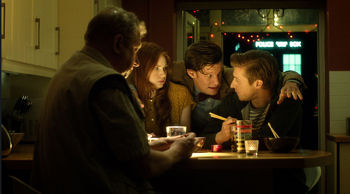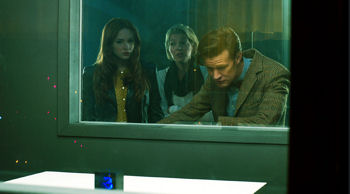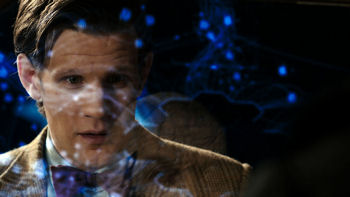If there are two things Gareth Roberts does better than anyone else in his scripts for the Eleventh Doctor, they're domestic life on Earth and warm-hearted humor. They're not traditionally the foremost qualities of Doctor Who, which makes them all the more welcome for bringing this era its unique flavor. Given their prevalence in this episode, it's remarkable that this isn't a Gareth Roberts script at all, but possibly Chris Chibnall's best contribution to the show to date.
Let's be clear: the "slow invasion" element of this story is pretty daft. The purpose behind it makes a glimmer of sense, but the mechanics are absurdly elaborate, the resolution far-fetched, and I doubt they bear close inspection. If you're inclined to pick this part of the story apart, you'll find all sorts of loose ends to pull and awkward questions to ask.
Unlike the previous story, though, this one treats its vaguely drawn sci-fi element largely as a MacGuffin, a means to the end of exploring the contrast between ordinary life and life aboard the TARDIS.
 The pleasures of the latter are obvious. Even while they're sitting in the garden contemplating eventually settling down, Amy and Rory can't contain their excitement at hearing the TARDIS materializing to pick them up.
The pleasures of the latter are obvious. Even while they're sitting in the garden contemplating eventually settling down, Amy and Rory can't contain their excitement at hearing the TARDIS materializing to pick them up.
We see a few more adventure-montage scenes, in which the Doctor gives Amy and Rory a night in the Savoy at the turn of the century as an anniversary present and the three of them visit the court of Henry VIII. But constant adventure also has its drawbacks, with one trip interrupted by Zygons (yes, an actual classic series monster from 1975) and the other by an accidental betrothal.
By contrast, we have reason to believe that in addition to their jobs, which give Amy and Rory a sense of purpose, their home life really does consist, as the Doctor suspects, of plenty of uninterrupted kissing. The Doctor has no such simple ways of occupying himself, and we get to see him go a little stir-crazy, living with Amy and Rory for an extended period of waiting for something to happen. "Patience is for wimps!" he declares just before jumping into the sort of slapstick hyperactivity montage only Matt Smith can make work.
 There are too many terrific lines and moments in this episode; I won't ruin them for you, and I couldn't enhance them by listing them off. A couple of these belong to Kate Stewart, the new head of UNIT, who is unfortunately not quite as charismatic and endearing as her classic series predecessor, but emblematizes a welcome new direction for the paramilitary organization. Many more of these belong to Mr. Williams, again doing a pitch-perfect performance as the quintessential dad with his methodical observation of the mysterious cubes that have appeared out of nowhere all across the Earth one ordinary morning.
There are too many terrific lines and moments in this episode; I won't ruin them for you, and I couldn't enhance them by listing them off. A couple of these belong to Kate Stewart, the new head of UNIT, who is unfortunately not quite as charismatic and endearing as her classic series predecessor, but emblematizes a welcome new direction for the paramilitary organization. Many more of these belong to Mr. Williams, again doing a pitch-perfect performance as the quintessential dad with his methodical observation of the mysterious cubes that have appeared out of nowhere all across the Earth one ordinary morning.
While the research methods everyone brings to the cubes are reckless to say the least (hopefully they at least tried more cautious forms of analysis before attempting to drown, crush, and otherwise destroy them), it's still appealing to see the Doctor and his associates attempting actual scientific inquiry as opposed to just knowing what's going on based on unseen experience.
 The montage of cubes and news segments and passing months is impressively stylish, continuing this season's promise of raising the bar on cinematic flair. The moment when a cube finally opens and we see what's inside is properly suspenseful, on par with the Box of Jhana in 1982's "Kinda" or, less obscurely, the blue box in Mulholland Drive.
The montage of cubes and news segments and passing months is impressively stylish, continuing this season's promise of raising the bar on cinematic flair. The moment when a cube finally opens and we see what's inside is properly suspenseful, on par with the Box of Jhana in 1982's "Kinda" or, less obscurely, the blue box in Mulholland Drive.
Of course, the box could have had anything at all inside it, and for the Doctor to be so close to it when it opens is the ultimate in reckless research methods. But then "reckless" is this Doctor's middle name, and though the foreshadowing that he's about to pay a steep price for it is at its heaviest, we can't be leading up to what this season is leading us to expect...can we?
We'll find out in the next episode. Meanwhile, we can enjoy the calm before the storm. Find out what the Doctor thinks of underground bases, the Wii, Twitter, and the Chicken Dance. Find out, indeed, what he thinks of Amy and Rory, and why he thinks it of them.
It's ironic that in a show capable of taking us anywhere in time and space, some of its finest moments can consist just of watching three best friends spending time together, and in a Chris Chibnall script, no less. To echo the Doctor: "that's new."

 The pleasures of the latter are obvious. Even while they're sitting in the garden contemplating eventually settling down, Amy and Rory can't contain their excitement at hearing the TARDIS materializing to pick them up.
The pleasures of the latter are obvious. Even while they're sitting in the garden contemplating eventually settling down, Amy and Rory can't contain their excitement at hearing the TARDIS materializing to pick them up.
 There are too many terrific lines and moments in this episode; I won't ruin them for you, and I couldn't enhance them by listing them off. A couple of these belong to Kate Stewart, the new head of UNIT, who is unfortunately not quite as charismatic and endearing as her classic series predecessor, but emblematizes a welcome new direction for the paramilitary organization. Many more of these belong to Mr. Williams, again doing a pitch-perfect performance as the quintessential dad with his methodical observation of the mysterious cubes that have appeared out of nowhere all across the Earth one ordinary morning.
There are too many terrific lines and moments in this episode; I won't ruin them for you, and I couldn't enhance them by listing them off. A couple of these belong to Kate Stewart, the new head of UNIT, who is unfortunately not quite as charismatic and endearing as her classic series predecessor, but emblematizes a welcome new direction for the paramilitary organization. Many more of these belong to Mr. Williams, again doing a pitch-perfect performance as the quintessential dad with his methodical observation of the mysterious cubes that have appeared out of nowhere all across the Earth one ordinary morning.
 The montage of cubes and news segments and passing months is impressively stylish, continuing this season's promise of raising the bar on cinematic flair. The moment when a cube finally opens and we see what's inside is properly suspenseful, on par with the Box of Jhana in 1982's "Kinda" or, less obscurely, the blue box in Mulholland Drive.
The montage of cubes and news segments and passing months is impressively stylish, continuing this season's promise of raising the bar on cinematic flair. The moment when a cube finally opens and we see what's inside is properly suspenseful, on par with the Box of Jhana in 1982's "Kinda" or, less obscurely, the blue box in Mulholland Drive.





